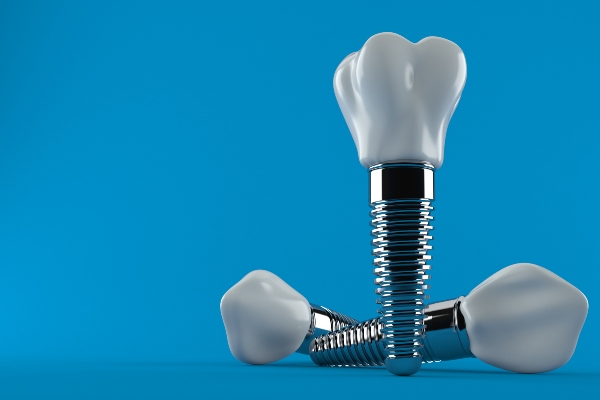Determining Which Type of Dental Implant Is Right for You
 Many types of dental implants are available. There are also many ways to attach them to your jawbone and gums. Working with your dentist can determine the right implants. Here are the different types of dental implants that are right for your dental needs.
Many types of dental implants are available. There are also many ways to attach them to your jawbone and gums. Working with your dentist can determine the right implants. Here are the different types of dental implants that are right for your dental needs.
The types of dental implants
These restorations have titanium rods that the dentist inserts into the jawbone. The rods will stay underneath the gumline and fuse with the jawbone. It will take about nine months for the healing and fusion to complete. Here are the known types of dental implants that the dentist may recommend:
- Subperiosteal dental implants are on top of the jawbone. The dentist will recommend these restorations if the jawbone is weak.
- Place-form implants are for patients with jaws that are not wide or strong enough to support dental implants.
- A ramus-frame implant is for individuals who have a narrow or weak jawbone. It is the least discreet and least invasive of all implants.
- Root-form dental implants need a direct insertion into the bone. It is a popular, well-known, durable type of dental implant. This is the right choice for people with strong jawbones.
Types of systems for dental implants
The dentist will assess the patient’s mouth before recommending any dental restoration. If the patient qualifies for dental implants, the dentist will determine the right type. The patient will receive implants that can ensure a healthy smile. Here are the different dental implant systems that the dentist might recommend:
- Implant-supported dentures are systems in which dental implants provide the highest level of stability. These restorations are much better than using denture creams or adhesives. An individual can have an entire dental arch replacement with implant-supported dentures. The dentist will need to attach at least two titanium rods per dental arch. More titanium rods mean more support and stability.
- Implant-supported bridges are better than having a dental bridge supported by dental crowns on abutment teeth. The neighboring teeth are left intact because the bridge does not need to attach to them for support. Chewing, biting, and smiling are possible without worries of having artificial teeth slipping out. This system is suitable for replacing many teeth at the same time.
- Single tooth dental implants are for patients who have one or two teeth missing in different parts of the dental arch. The implant surgery can happen in an hour if the patient does not need other dental procedures to prepare the jawbone. After about three to nine months, the fusion of the titanium rods to the jawbone and gum tissue will be complete. The patient will need to return to the clinic for the abutment attachment. Two weeks later, the dentist will attach the custom-fit dental crown to the abutment. The crown’s color will be like the color of the neighboring natural teeth.
Replacing missing teeth with dental implants can enhance your quality of life
Tooth loss is a major dental crisis that needs immediate attention. Replacing the missing tooth or teeth can prevent many complications. Your dentist can help you decide which dental implants can help you the most. Working with your dentist can make your restorations last for a long time.
Request an appointment or call Thanasas Family Dental Care at 248-260-2878 for an appointment in our Troy office.
Recent Posts
Dental implants are a leading choice for many patients when it comes to tooth replacement. Patients like the idea of a tooth replacement option resembling natural teeth. Dental implants look natural and perform like a permanent natural tooth. Therefore, there is no need to take the tooth replacement out daily for cleaning or worry about…
Many patients prefer dental implants to other dental restorations. The stability and aesthetic improvement that the implants provide can enhance one’s bite and speech, as well as one’s chew and smile. Understanding why implants are popular can convince you to speak to your dentist about getting them. Here are the reasons for the popularity of…
Most people want to have dental implants right after dental extraction. Replacing the lost tooth is a priority. This can prevent more complications as the mouth heals. Understanding the process of getting implants after dental extraction can help prepare you for your appointment. Here are the details about getting dental implants after a dentist removes…


